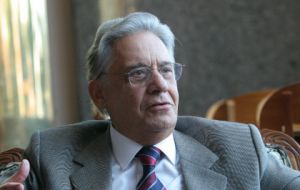MercoPress. South Atlantic News Agency
Brazil needs a budget surplus and strong savings, recommends former president
 Former president Fernando Cardoso, considered the creator of the strong Real
Former president Fernando Cardoso, considered the creator of the strong Real It is not possible to control the value of Brazil's currency through taxes on foreign capital, former President Fernando Cardoso told the US network Consumer News and Business Channel, CNBC.
”I understand (the taxes are) necessary because the Real is over-valuated. But what is the meaning of over-valuated? It depends on the world situation, on the U.S dollar, not just Brazil's set of faults“ said the former president in an interview with CNBC. Maybe “it’s better to leave the capital flow more open”.
However Cardoso emphasized that the current government of Dilma Rousseff has to control public expenses and encourage savings.
”It is important to keep the economy in equilibrium“ he said. ”It is important to keep the stability and increase savings. There is no other recipe. The only recipe is to invest more and more“ by stimulating markets.
He said his most important policy during his two terms from 1995 to 2003 was stabilizing the Real. Cardoso is credited with having started the Real as Finance minister and later as president, ending decades of double digit inflation in Latin American’s largest economy.
”We believe the currency is an important symbol for the trust of the nation,“ he said. ”Inflation is a terrible tax. Poor people don’t have the instruments to fix what the inflation is damaging.“ He said at the time the Real was stabilized 10% of the population was below the poverty line, ”and now they are in better shape.“
He added he wouldn't have been able to accomplish stabilization without democracy coming to Brazil in the late 1980s and then the opening of Brazilian markets to the world.
Cardoso said the creation of regulatory agencies for telecommunications, energy and other sectors imposed the rule of law while encouraging economic growth.
”No less than 400 billion US dollars came to Brazil after stabilization in the mid-1990s,“ he said. ”Maybe only China received comparably more than Brazil”.




Top Comments
Disclaimer & comment rulesCommenting for this story is now closed.
If you have a Facebook account, become a fan and comment on our Facebook Page!